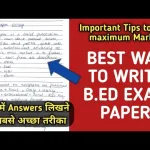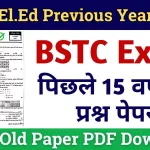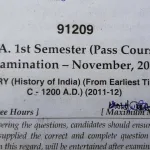Example question paper for the B.Ed. (Bachelor of Education) 4th semester along with answers. Please note that this is a example and may not match the exact format or content of your institution’s exam.
B.Ed. 4th Semester Examination Question Paper
Subject: Educational Technology and ICT in Education
Time: 3 Hours
Maximum Marks: 80
Part A: Short Answer Questions (5 x 4 = 20 Marks)
- Define Educational Technology. How does it differ from Instructional Technology?
- Explain the role of ICT in education.
- What are the principles of effective multimedia design?
- Discuss the impact of social media on students’ learning.
- What is the ADDIE model? Briefly describe its stages.
Part B: Long Answer Questions (3 x 10 = 30 Marks)
- Critically analyze the advantages and disadvantages of e-learning. Provide examples to support your answer.
- Describe the different types of educational software available for classroom use. How can they enhance teaching and learning?
- Discuss the ethical considerations involved in the use of technology in education.
Part C: Essay Type Question (1 x 15 = 15 Marks)
- Design a detailed lesson plan for a subject of your choice using ICT tools. Include objectives, materials needed, instructional strategies, and assessment methods.
Part D: Case Study (1 x 15 = 15 Marks)
- Read the following case study and answer the questions that follow:
Case Study:
ABC School recently integrated a range of ICT tools into their teaching practices. These tools include interactive whiteboards, online assessment platforms, and educational apps. Teachers received training on how to use these tools effectively. However, after six months, the school observed that student engagement and performance had not significantly improved.
Questions:
a) Identify possible reasons why the integration of ICT tools did not lead to the expected improvement.
b) Suggest strategies to enhance the effectiveness of ICT tools in this context.
c) Discuss how the school can assess the impact of ICT on teaching and learning more accurately.
Answers:
Part A: Short Answer Questions
- Educational Technology vs. Instructional Technology:
- Educational Technology: The application of scientific knowledge about learning and conditions of learning to improve the effectiveness and efficiency of teaching and training.
- Instructional Technology: A subset of educational technology, focusing specifically on the process of teaching and learning with the help of technological resources.
- Role of ICT in Education:
- Enhances learning experiences through interactive and engaging content.
- Provides access to a vast array of resources and information.
- Facilitates collaboration and communication among students and teachers.
- Supports differentiated instruction and personalized learning.
- Principles of Effective Multimedia Design:
- Simplicity: Avoid unnecessary complexity.
- Consistency: Use consistent design elements.
- Contrast: Ensure good contrast for readability.
- Alignment: Align elements to create a clean look.
- Repetition: Repeat design elements to create a cohesive look.
- Impact of Social Media on Students’ Learning:
- Positive Impact: Encourages collaboration, enhances communication, and provides access to a wealth of information and resources.
- Negative Impact: Can be a source of distraction, lead to information overload, and sometimes spread misinformation.
- The ADDIE Model:
- Analysis: Identify learning needs and goals.
- Design: Plan the learning experience and outcomes.
- Development: Create the learning materials.
- Implementation: Deliver the learning experience.
- Evaluation: Assess the effectiveness of the learning experience.
Part B: Long Answer Questions
- Advantages and Disadvantages of E-learning:
- Advantages:
- Flexibility in time and location.
- Access to diverse resources.
- Cost-effective and scalable.
- Disadvantages:
- Requires self-discipline and motivation.
- May lack personal interaction.
- Dependence on technology and internet access.
- Advantages:
- Types of Educational Software:
- Drill and Practice: Reinforces learning through repetition.
- Tutorial: Provides comprehensive instruction on a topic.
- Simulation: Creates realistic scenarios for experiential learning.
- Educational Games: Engages students through gamified learning.
- Assessment Software: Assists in evaluating student performance.
- Ethical Considerations in Technology Use:
- Privacy: Protecting student data and personal information.
- Equity: Ensuring equal access to technological resources.
- Intellectual Property: Respecting copyright laws and intellectual property.
- Digital Citizenship: Promoting responsible and ethical use of technology.
Part C: Essay Type Question
- Lesson Plan Using ICT Tools:
- Subject: Science – The Solar System
- Objectives:
- Students will identify the planets in the solar system.
- Students will understand the characteristics of each planet.
- Materials Needed: Interactive whiteboard, educational apps, internet access.
- Instructional Strategies:
- Use an interactive app to explore the solar system.
- Watch a video on the formation of the solar system.
- Group discussion on the characteristics of each planet.
- Assessment Methods:
- Quiz using an online assessment platform.
- Group presentation on a chosen planet.
Part D: Case Study
- Case Study Analysis: a) Possible Reasons for Lack of Improvement:
- Insufficient training for teachers.
- Lack of alignment between ICT tools and curriculum.
- Inadequate student engagement with the tools. b) Strategies to Enhance ICT Effectiveness:
- Provide ongoing professional development for teachers.
- Integrate ICT tools into the curriculum more effectively.
- Encourage student participation and feedback on ICT tools. c) Assessing ICT Impact:
- Conduct surveys and interviews with students and teachers.
- Analyze performance data before and after ICT integration.
- Use formative and summative assessments to measure learning outcomes.
Exam Syllabus for B.Ed. 4th Semester Examination
The syllabus for the B.Ed. 4th Semester Examination can vary depending on the university or institution offering the program. However, a typical syllabus might cover the following subjects and topics:
1. Educational Technology and ICT
Introduction to Educational Technology
- Definition, meaning, and scope
- Types of educational technology: hardware and software
ICT in Education
- Role and importance of ICT
- Tools and applications of ICT in education
E-Learning and Online Education
- Concepts and models of e-learning
- Advantages and challenges of online education
Teaching Aids and Media
- Traditional and modern teaching aids
- Multimedia in education
2. Guidance and Counseling
Introduction to Guidance
- Meaning, nature, and scope
- Types of guidance: educational, vocational, and personal
Counseling: Concept and Process
- Meaning and importance of counseling
- Types of counseling: individual and group
Skills and Techniques in Counseling
- Essential counseling skills
- Techniques and approaches in counseling
Guidance Services in Schools
- Role of teachers in guidance and counseling
- Organization of guidance programs in schools
3. Inclusive Education
Concept of Inclusive Education
- Meaning, need, and importance
- Principles of inclusive education
Policies and Legislations
- National and international policies
- Rights of children with special needs
Teaching Strategies and Approaches
- Differentiated instruction
- Universal design for learning (UDL)
Challenges and Solutions
- Barriers to inclusive education
- Strategies to overcome challenges
4. School Management and Leadership
Concept of School Management
- Meaning, nature, and scope
- Principles and functions of school management
Leadership in Education
- Styles of leadership
- Role of educational leaders
School Organization and Administration
- Structure and functions of school administration
- Management of school resources
Quality Management in Schools
- Concepts of quality in education
- Tools and techniques for quality improvement
5. Assessment and Evaluation
Introduction to Assessment and Evaluation
- Meaning, purpose, and types
- Difference between assessment and evaluation
Tools and Techniques of Assessment
- Formative and summative assessment
- Quantitative and qualitative techniques
Construction and Standardization of Tests
- Characteristics of a good test
- Steps in test construction
Recent Trends in Evaluation
- Continuous and comprehensive evaluation (CCE)
- Use of ICT in assessment
6. Contemporary Issues in Education
Current Educational Policies and Practices
- National Education Policy
- Educational reforms and initiatives
Equity and Equality in Education
- Gender, caste, and regional disparities
- Strategies for promoting equity
Environmental Education
- Importance of environmental education
- Sustainable development and education
Globalization and Education
- Impact of globalization on education
- Comparative education
- Practical Components
Internship and Teaching Practice
- Classroom teaching practice
- Lesson planning and execution
Project Work and Assignments
- Educational research projects
- Preparation of teaching aids and materials
Workshops and Seminars
- Participation in workshops and seminars
- Presentation of papers and reports
Exam Pattern for B.Ed. 4th Semester Examination
The exam pattern for the B.Ed. 4th Semester Examination typically includes various components to assess the comprehensive understanding and skills of students.
1. Theory Exams
Written Examinations:
- Format: Theoretical exams generally consist of multiple-choice questions (MCQs), short answer questions, and long essay-type questions.
- Sections: The paper is usually divided into different sections, each covering various topics from the syllabus.
- Duration: Exams are typically 2-3 hours long.
- Marks Distribution: Marks are allotted based on the complexity and length of the questions. For instance, MCQs might carry 1-2 marks each, short answers 5-10 marks, and long essays 15-20 marks.
- Example:
- Section A: 20 MCQs (20 marks)
- Section B: 5 Short answer questions (25 marks)
- Section C: 3 Essay-type questions (30 marks)
2. Practical Examinations
Teaching Practice:
- Lesson Planning: Students are required to prepare detailed lesson plans.
- Classroom Teaching: Conducting actual classroom sessions, which are observed and evaluated.
- Assessment: Evaluation is based on teaching skills, lesson execution, classroom management, and student engagement.
Workshops and Seminars:
- Participation: Active participation in workshops and seminars conducted during the semester.
- Presentations: Students might be required to give presentations on assigned topics.
- Reports: Writing detailed reports on the workshops and seminars attended.
3. Internship
Internship/Field Work:
- Duration: Internships typically last for a specified period, such as a few weeks or months.
- Activities: Involvement in school activities, teaching, and administrative tasks.
- Evaluation: Based on performance during the internship, feedback from mentor teachers, and a final internship report.
4. Assignments and Projects
Assignments:
- Types: Can include essays, research papers, case studies, reflective journals, and preparation of teaching aids.
- Submission: Usually required to be submitted by specified deadlines.
Projects:
- Research Projects: Students may need to conduct research on educational topics, compile data, and present findings.
- Evaluation: Based on originality, depth of analysis, clarity of presentation, and adherence to guidelines.
5. Viva Voce
Oral Examinations:
- Format: An oral examination where students are questioned about their projects, internships, and theoretical knowledge.
- Evaluation: Based on understanding, articulation, and ability to engage in academic discussion.
6. Continuous Internal Assessment
Internal Assessments:
- Components: May include quizzes, class participation, mid-term exams, group discussions, and regular assignments.
- Marks Distribution: Internal assessments often constitute a significant portion of the final grade, sometimes around 20-40%.
Example Exam Pattern for Specific Subjects
Educational Technology and ICT:
- Theory Exam: 70 marks (combination of MCQs, short answers, and essays)
- Practical: 30 marks (based on ICT projects, teaching aids, etc.)
Guidance and Counseling:
- Theory Exam: 70 marks
- Assignments/Projects: 30 marks (case studies, counseling session reports)
Inclusive Education:
- Theory Exam: 70 marks
- Field Work/Assignments: 30 marks (practical implementation of inclusive strategies)
Frequently asked questions (FAQs) related to the B.Ed. 4th Semester Examination:
1. What is the structure of the B.Ed. 4th Semester Examination?
The B.Ed. 4th Semester Examination typically includes written exams, practical assessments, assignments, and sometimes viva voce. The structure may vary depending on the university.
2. What subjects are covered in the B.Ed. 4th Semester?
Common subjects include Educational Technology and ICT, Guidance and Counseling, Inclusive Education, School Management and Leadership, Assessment and Evaluation, and Contemporary Issues in Education. Check with your specific institution for the exact syllabus.
3. How should I prepare for the B.Ed. 4th Semester exams?
Review your course materials, focus on key concepts, practice past papers, participate in group studies, and seek guidance from your professors.
4. Are there any recommended books or resources?
Your course instructors usually provide a list of recommended textbooks. Additionally, educational websites, journals, and online resources like Coursera or Khan Academy can be helpful.
5. What is expected during the teaching practice/internship?
You are expected to plan and deliver lessons, manage a classroom, assess student progress, and participate in school activities. Reflective journals and reports are often required.
6. How is the internship evaluated?
Evaluation is based on lesson planning, teaching skills, classroom management, student engagement, and feedback from your mentor teacher and supervisor.
7. What kind of projects or assignments are required in the 4th semester?
Assignments can include research projects, preparation of teaching aids, case studies, and reflective essays. Specific details will be provided by your instructors.
8. How are projects and assignments graded?
Grading criteria typically include originality, depth of analysis, application of theoretical knowledge, clarity of presentation, and adherence to guidelines.
9. What are the passing criteria for the 4th Semester exams?
The passing criteria usually involve achieving a minimum percentage in both theory and practical components. This percentage can vary by institution.
10. What happens if I fail an exam or practical component?
You may have to reappear for the failed component in a supplementary exam. Check your institution’s policies for details on retakes and supplementary exams.
11. When are the exam dates announced?
Exam dates are typically announced a few months in advance. Keep an eye on official notices from your university.
12. How do I apply for the 4th Semester exams?
The application process usually involves filling out an exam form and paying the requisite fees. Details will be provided by your institution’s examination department.
13. What should I do if there is a clash in exam schedules?
Contact the examination office immediately to inform them of the clash. They may provide alternative arrangements.
14. Are there any tips for managing exam stress?
Maintain a study schedule, take regular breaks, engage in physical activity, practice relaxation techniques, and seek support from peers and mentors.
15. What is the format of the written exams?
The format generally includes multiple-choice questions, short answers, and essay-type questions. Specific formats will be detailed in your exam guidelines.
16. How can I access my exam results?
Results are usually posted on the university’s official website or student portal. You may also receive notifications via email or SMS.
17. What if I have a grievance regarding my exam results?
Universities have a formal grievance redressal mechanism. You can file a complaint or request a re-evaluation as per the institution’s policies.
18. How important are attendance and participation in the 4th Semester?
Attendance and active participation are crucial, as they often factor into your overall grade and are essential for successful completion of practical components.
Latest Posts
- Step-by-step guide to download and apply for jee mains admit card 202
- Comprehensive 2025 government holidays and recruitment details for job seekers
- JEE Mains Admit Card 2025: Your Step-by-Step Guide to Downloading the Hall Ticket
- Everything You Need to Know About 2025 Government Holidays Recruitment
- Comprehensive Guide to rrb d group recruitment 2025 – Eligibility, Vacancies, and Application
- Detailed guide to nps trust recruitment 2025 vacancies, eligibility and apply process
- Comprehensive guide to hpcl recruitment 2025 notification, vacancies, and application process
- ignou bed admission 2025 complete recruitment guide with eligibility and process
- Comprehensive Guide to Indian Army Agniveer Recruitment 2025 Notification and Jobs
- Everything You Must Know About CBSE Board Exams 2025 Changes & New Rules






